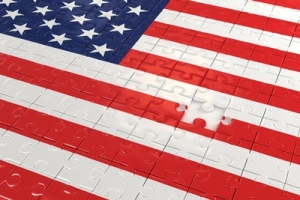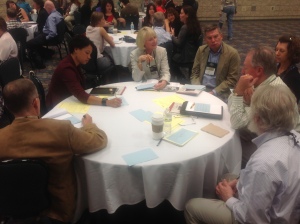 In the last year I’ve become part of an group to find ways to make history more meaningful and relevant to Americans. The History Relevance Campaign, for lack of a better name, is an informal grassroots effort made up of public historians, preservationists, educators, historic site managers, and museum leaders who are creating a national, broad-based strategy to assert the relevance of history.
In the last year I’ve become part of an group to find ways to make history more meaningful and relevant to Americans. The History Relevance Campaign, for lack of a better name, is an informal grassroots effort made up of public historians, preservationists, educators, historic site managers, and museum leaders who are creating a national, broad-based strategy to assert the relevance of history.
Just to clarify, the History Relevance Campaign is not connected to any one history organization. From its start in early 2013, the group has strived to be as inclusive as possible. Secondly, it is not a lobbying group. Its main audience is the general public, not elected officials and public policy makers. Thirdly, its intent is to show that history skills are just as important as STEM (science, technology, engineering, and math) and that balance should be a goal for school curriculum. Finally, it builds upon and aligns with the work of many organizations, including the American Historical Association’s Tuning Project, which, among other outcomes, aims to communicate to a broad audience the significance and value of a history degree; the American Academy of Arts and Sciences “The Heart of the Matter” report, which outlines the vital role of the humanities; the first national evaluation of National History Day, which shows that participants perform better and more thoughtfully in school; the research of Sam Weinberg and the Stanford History Education Group that shows that “historical thinking” is a distinct (and unnatural) skill; and AASLH’s work on the Gift of History and A Common Agenda for History Museums.
Efforts to promote history’s value to society have been ongoing so we’re not only trying to keep the conversation alive, but find connections and test ideas to see where there’s an opportunity to work together. This particular campaign was sparked in November 2012 by a conversation at the Seminar for Historical Administration, a training program that attracts mid-career history professionals from around the country. The following February during Museum Advocacy Day, an exploratory meeting of twelve people brought together representatives from the Smithsonian, American Historical Association, National Council on Public History (NCPH), National History Day, American Association for State and Local History (AASLH), and three state history organizations. At that point, we determined we should seize more opportunities to listen to history folks of all shapes and sizes to form consensus around an action plan. This is most easily accomplished when history leaders gather, so we’ve held discussions at the NCPH conference; the American Alliance of Museum’s annual meeting; at National History Day’s national competition; AASLH’s annual meeting in September 2013, both at the CEO Forum and in a general session; and most recently at the State Historical Administrators Meeting in New Mexico.
What we’ve heard so far in our conversations is that history is valuable because it plays a significant role in five ways:
- forming identity
- developing critical thinking skills
- encouraging civic engagement
- building leadership
- creating a legacy.
We are fleshing out each of these ideas by conducting a literature search to locate research or studies that relate to each of these topics.
We’ve also created a History Relevance Campaign discussion group on LinkedIn that has attracted nearly 100 members and is open to anyone. I’ll report on some its activities here, but the LinkedIn group is more comprehensive and timely. In the next couple months, we will launch a website in History Commons to share documents.
We are also continuing the conversation by sharing what the group has done so far, hearing your thoughts about what makes history important and useful, and learning from you about historical programs (involving museums, K-12 education, historical sites, higher education, etc.) that excel in communicating or demonstrating the relevance of history. Coming up are:
Friday, January 3, 2014 from 12:30 p.m.-2:15 p.m. in Washington, DC in Maryland Room B at the Washington Marriott Wardman Park Hotel (near Woodley Park Metro station).
“A Continuing Conversation about Making History Relevant to All Americans.” The meeting will take place during the American Historical Association’s annual meeting in space which the AHA has generously provided in its main conference hotel but AHA registration is not required for this session and you’re welcome to bring a brown bag lunch.
Discussion leaders: Tim Grove, National Air and Space Museum; Cathy Gorn, National History Day; Max A. van Balgooy, Engaging Places, LLC; Kim Fortney, National History Day
Space is limited so please RSVP at https://www.surveymonkey.com/s/HRCOpenForum
Saturday, March 22, 2014 from 10:30 am-12:00 pm in Monterey, California as part of the National Council on Public History annual meeting.
“History Relevance Campaign: A National Branding Strategy for History”
Facilitators: Max A. van Balgooy, Engaging Places, LLC; Kim Fortney, National History Day; Tim Grove, Chief of Museum Learning, National Air and Space Museum; John Dichtl, National Council on Public History
If you’d like to learn more, contact one of the members of the steering committee (just remember, this isn’t an organization and there’s no membership–discuss your ideas through the LinkedIn group, participate in an upcoming meeting, or talk about it with your colleagues):
- John Dichtl, National Council on Public History
- John Durel, Durel Consulting Partners
- Kim Fortney, National History Day
- Janet Gallimore, Idaho State Historical Society
- Cathy Gorn, National History Day
- Conny Graft, Research and Evaluation
- Tim Grove, Smithsonian Institution
- Max A. van Balgooy, Engaging Places
- Kent Whitworth, Kentucky Historical Society


I love this idea and there are some great people involved in it!
I have one quibble – the challenge is not to make history relevant. It already is. It’s to show that relevance explicitly and in a relatable way.
LikeLike
Great point, Amanda. Thanks!
LikeLike
Glad to see any effort to increase engagement with history across all segments of the population, not just those of us who are already “hooked.” Our “Make this holiday historic!” campaign (http://www.thehistorylist.com/the-holiday-campaign-for-history), which provides, at no cost, research and digital assets history organizations can use to promote their holiday events, was our modest way of doing this, focusing on the holidays as a way to get people into historic buildings and sites that they might not consider visiting at other times of the year. Really looking forward to reading the progress of this new effort. I agree with Amanda: Given the people involved, it certainly looks promising.
LikeLike
Max,
Nice summary. I recently ran across a reference to the 1892 Committee of Ten, among which members was future President Thomas Woodrow Wilson. Their conclusion to the same questions came down to just one word: judgment. History like no other discipline trains people to exercise judgment. If modern culture is an indicator, Americans need history now more than ever.
LikeLike
Here’s an essay that John F. Kennedy wrote about the relevance of history.
http://www.americanheritage.com/content/jfk-our-nation%E2%80%99s-memory
LikeLike
Great article, Tim. Thanks for sharing it. Max and company, I am very pleased to see this effort continuing.
LikeLike